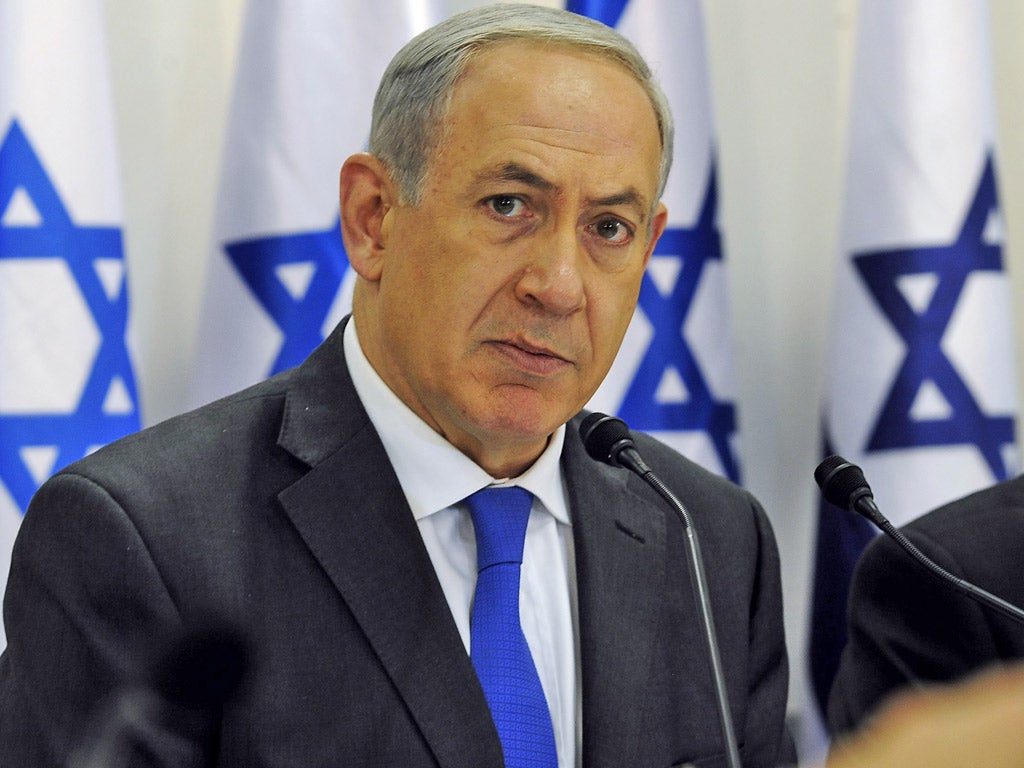Israeli PM Benjamin Netanyahu stalls on calls to aid Palestinian suicide bombings victims' families as they sue Bank of China
Lawyers want leader to grant permission for former agent to testify

Your support helps us to tell the story
From reproductive rights to climate change to Big Tech, The Independent is on the ground when the story is developing. Whether it's investigating the financials of Elon Musk's pro-Trump PAC or producing our latest documentary, 'The A Word', which shines a light on the American women fighting for reproductive rights, we know how important it is to parse out the facts from the messaging.
At such a critical moment in US history, we need reporters on the ground. Your donation allows us to keep sending journalists to speak to both sides of the story.
The Independent is trusted by Americans across the entire political spectrum. And unlike many other quality news outlets, we choose not to lock Americans out of our reporting and analysis with paywalls. We believe quality journalism should be available to everyone, paid for by those who can afford it.
Your support makes all the difference.Efforts by families of the victims of Palestinian suicide bombings to sue the Bank of China in the United States for allegedly allowing Hamas and Islamic Jihad – both recognised as terrorist groups in the US – to channel funding through its branches has created a pointed diplomatic conundrum for the Israeli government as it seeks warmer relations with Beijing.
Lawyers in two cases now before US District Court Judge Shira Scheindlin in New York are pressing Benjamin Netanyahu, the Israeli Prime Minister, to stand by his commitment to fight terrorism by any means by granting permission for a former Israeli counter-terrorism agent to testify.
That Mr Netanyahu may be trying to put the brakes on the case was first reported by the Israeli newspaper Yedioth Ahronoth last month. It suggested that as part of the preparations for a high-level visit to China last May, the Prime Minister had promised Beijing not to allow any Israeli civil servants, retired or otherwise, to assist in the case.
On a recent trip to Washington, the former counter-terrorism official, Uzi Shaya, was ordered to give a deposition in New York on 25 November. Lawyers for the families and the judge herself have all indicated that his co-operation will prove pivotal. But there is as yet no confirmation that Mr Shaya, who lives in Israel, will attend.
Previous reports hinted at behind-closed-doors efforts by the Israeli government to engineer a settlement in the cases which, if they reach trial, are certain to draw intense media attention, unlikely to be welcomed by either the Netanyahu government or China.
Representing 22 families suing the Bank of China under US laws that forbid financing of terror networks is Nitsana Darshan-Leitner, the Israeli lawyer with a long track record of pursuing Palestinian extremists with court actions.
“Israel has to decide whether they are fighting terrorism and continuing the struggle which they initiated... or collapsing to the pressure of China and abandoning the terror victims,” she told AP this week.Also before Judge Scheindlin is a related case brought by the family of Daniel Wultz, a 16-year-old American citizen killed by a suicide bombing in Tel Aviv in 2006.
His father Yekutiel is seeking damages running to hundreds of millions of dollars. The family is represented by the law firm of David Boies, who represented Al Gore in the contested 2000 US presidential election.
In both cases, the plaintiffs contend that Mr Shaya was among a group of Israeli government officials who allegedly met representatives of the Bank of China in 2005 to warn them that the terror groups were using accounts with the bank to funnel money coming from Iran and Syria to its operatives in the Gaza Strip. They also contend that the Bank of China ignored the warning and did nothing to stop the transactions.
Judge Scheindlin is believed to have written letters to the Israeli government at least twice asking that it give permission to Mr Shaya to testify. At a hearing in July, she signalled that she agreed with the plaintiffs’ lawyers that his co-operation was paramount.
Israel, she said, according to transcripts, has to reach a “make-or-break decision” for the case. “This may be the only person who really has the knowledge as to what transpired at the meeting.”
For his part, Mr Shaya has intimated that his hands are tied. “In light of my moral and national obligation and my commitment to the war on terror, I am inclined to give a deposition,” he wrote in a letter to the victims’ lawyers. “However, thus far, the State of Israel has not yet formulated its final position on the matter.”
Any perception that Mr Netanyahu may be prioritising his well-advertised desire to forge closer ties with Beijing over assisting in the cases would clearly sit badly with the US that has long applauded him for his commitment to fighting terror groups. The Wultz suit will have a particularly high profile, not least because the victim’s mother, Sheryl, is a cousin of US House Majority Leader Eric Cantor.
Israel’s relations with China cooled significantly at the start of the last decade but is now intensifying, in part because of the influence Beijing has with two of the greatest regional threats to Israeli security: Iran and Syria.
Join our commenting forum
Join thought-provoking conversations, follow other Independent readers and see their replies
Comments